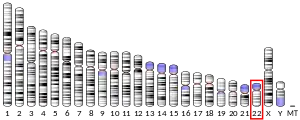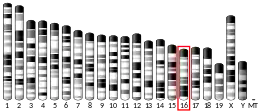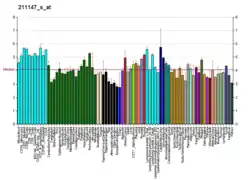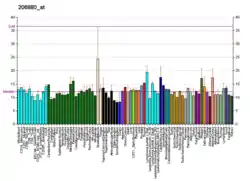P2RX6
P2X purinoceptor 6 is a protein that in humans is encoded by the P2RX6 gene.[5][6][7][8]
The protein encoded by this gene belongs to the family of P2X receptors, which are ATP-gated ion channels and mediate rapid and selective permeability to cations. This gene is predominantly expressed in skeletal muscle, and regulated by p53. The encoded protein is associated with VE-cadherin at the adherens junctions of human umbilical vein endothelial cells.[8]
See also
References
- GRCh38: Ensembl release 89: ENSG00000099957 - Ensembl, May 2017
- GRCm38: Ensembl release 89: ENSMUSG00000022758 - Ensembl, May 2017
- "Human PubMed Reference:". National Center for Biotechnology Information, U.S. National Library of Medicine.
- "Mouse PubMed Reference:". National Center for Biotechnology Information, U.S. National Library of Medicine.
- Urano T, Nishimori H, Han H, Furuhata T, Kimura Y, Nakamura Y, Tokino T (Sep 1997). "Cloning of P2XM, a novel human P2X receptor gene regulated by p53". Cancer Res. 57 (15): 3281–7. PMID 9242461.
- Dunham I, Shimizu N, Roe BA, Chissoe S, Hunt AR, Collins JE, Bruskiewich R, Beare DM, Clamp M, Smink LJ, Ainscough R, Almeida JP, Babbage A, Bagguley C, Bailey J, Barlow K, Bates KN, Beasley O, Bird CP, Blakey S, Bridgeman AM, Buck D, Burgess J, Burrill WD, O'Brien KP, et al. (Dec 1999). "The DNA sequence of human chromosome 22". Nature. 402 (6761): 489–95. Bibcode:1999Natur.402..489D. doi:10.1038/990031. PMID 10591208.
- Collo G, North RA, Kawashima E, Merlo-Pich E, Neidhart S, Surprenant A, Buell G (Sep 1996). "Cloning OF P2X5 and P2X6 receptors and the distribution and properties of an extended family of ATP-gated ion channels". J Neurosci. 16 (8): 2495–507. doi:10.1523/JNEUROSCI.16-08-02495.1996. PMC 6578782. PMID 8786426.
- "Entrez Gene: P2RXL1 purinergic receptor P2X-like 1, orphan receptor".
Further reading
- Khakh BS, Burnstock G, Kennedy C, et al. (2001). "International union of pharmacology. XXIV. Current status of the nomenclature and properties of P2X receptors and their subunits". Pharmacol. Rev. 53 (1): 107–18. PMID 11171941.
- Soto F, Garcia-Guzman M, Karschin C, Stühmer W (1996). "Cloning and tissue distribution of a novel P2X receptor from rat brain". Biochem. Biophys. Res. Commun. 223 (2): 456–60. doi:10.1006/bbrc.1996.0915. PMID 8670303.
- Glass R, Loesch A, Bodin P, Burnstock G (2002). "P2X4 and P2X6 receptors associate with VE-cadherin in human endothelial cells". Cell. Mol. Life Sci. 59 (5): 870–81. doi:10.1007/s00018-002-8474-y. PMID 12088286. S2CID 16519633.
- Maguire PB, Wynne KJ, Harney DF, et al. (2003). "Identification of the phosphotyrosine proteome from thrombin activated platelets". Proteomics. 2 (6): 642–8. doi:10.1002/1615-9861(200206)2:6<642::AID-PROT642>3.0.CO;2-I. PMID 12112843. S2CID 22665513.
- Strausberg RL, Feingold EA, Grouse LH, et al. (2003). "Generation and initial analysis of more than 15,000 full-length human and mouse cDNA sequences". Proc. Natl. Acad. Sci. U.S.A. 99 (26): 16899–903. Bibcode:2002PNAS...9916899M. doi:10.1073/pnas.242603899. PMC 139241. PMID 12477932.
- Collins JE, Wright CL, Edwards CA, et al. (2005). "A genome annotation-driven approach to cloning the human ORFeome". Genome Biol. 5 (10): R84. doi:10.1186/gb-2004-5-10-r84. PMC 545604. PMID 15461802.
- Gerhard DS, Wagner L, Feingold EA, et al. (2004). "The status, quality, and expansion of the NIH full-length cDNA project: the Mammalian Gene Collection (MGC)". Genome Res. 14 (10B): 2121–7. doi:10.1101/gr.2596504. PMC 528928. PMID 15489334.
- Barrera NP, Ormond SJ, Henderson RM, et al. (2005). "Atomic force microscopy imaging demonstrates that P2X2 receptors are trimers but that P2X6 receptor subunits do not oligomerize". J. Biol. Chem. 280 (11): 10759–65. doi:10.1074/jbc.M412265200. PMID 15657042.
- Kimura K, Wakamatsu A, Suzuki Y, et al. (2006). "Diversification of transcriptional modulation: large-scale identification and characterization of putative alternative promoters of human genes". Genome Res. 16 (1): 55–65. doi:10.1101/gr.4039406. PMC 1356129. PMID 16344560.
External links
- P2RXL1+protein,+human at the U.S. National Library of Medicine Medical Subject Headings (MeSH)
This article incorporates text from the United States National Library of Medicine, which is in the public domain.
This article is issued from Wikipedia. The text is licensed under Creative Commons - Attribution - Sharealike. Additional terms may apply for the media files.





